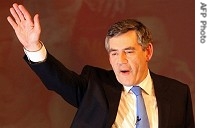2007年VOA标准英语-Gordon Brown Becomes Britain's New Prime Minist(在线收听)
London
25 June 2007
Gordon Brown becomes Britain's new prime minister this week, succeeding Tony Blair, who has held the office for the past 10 years. Mr. Brown is no newcomer to politics, but many are wondering how well he'll make the transition to the limelight, as VOA's Sonja Pace reports from London.
 |
| Gordon Brown receives applause after being confirmed as leader of British Labor Party during Party leadership conference in Manchester, 24 Jun 2007 |
"It is with humility and it's with pride and it's with a great sense of duty that I accept the privilege, the great responsibility of leading our party and changing our country," Brown said.
And, accepting the labor party leadership, Gordon Brown knew that within days he would become Britain's next prime minister, succeeding his political friend and rival, Tony Blair. Word was he had been waiting for this for years.
The two men first shared an office back in 1983 when both were newly elected labor party politicians. They worked together to bring the party back from the political wilderness, to make it more modern, more appealing to voters.
Professor Anthony Seldon of London's Wellington College says their relationship was close and complex.
"They were like brothers. It was a love-hate relationship," Seldon said. "There was certainly great love between them and great admiration. But, there was also hatred and shouting and intense anger and poisonous words."
There was talk the two men had a deal - that the more charismatic Tony Blair would become prime minister, and then give Gordon Brown a chance after the first term. It seems Mr. Blair stayed on longer than expected. Anthony Seldon says the bone of contention between them was simple - who should be at the top.
"Gordon Brown always felt that he was the brighter person, that he had a clearer idea of what the country needed, about what the Labor Party stood for," Seldon noted. "He thought he was an abler person, more in touch with working people, more in touch with the nation … and he didn't like the fact that it was a man, who he thought a lesser man, sitting in the powerful seat."
Throughout Tony Blair's premiership, Gordon Brown served as treasury chief, and supporters and critics alike credit him for the country's economic stability and for low unemployment.
He was born near Glasgow in Scotland, the son of a protestant minister. He joined the Labor Party in his teenage years, lost his sight in one eye in a sporting injury, and earned a doctorate at Edinburgh University.
Mr. Brown readily talks of his family values, which he says shape his political beliefs.
"All that I believe, and all I try to do comes from the values that I grew up with - duty, honesty, hard work, family, respect for others," Brown said.
And, those values, says former conservative politician, Michael Brown, also characterize Gordon Brown's style.
"Gordon Brown is the son of a Methodist minister, he's very Presbyterian in style. I think that there will be a turning away from the spin, the glitz, the glamour, and we'll have a much more traditional prime minister," he said.
There is widespread agreement that Gordon Brown is brilliant, hardworking and serious, but he is also often seen as too somber, somewhat dictatorial and without charisma.
In 2000, the 49-year-old long-time bachelor married Sarah Macaulay, a public relations consultant. Their first child died shortly after a premature birth in 2001. The couple now has two sons, one born in 2003 and one last year.
Fatherhood softened Gordon Brown's image somewhat, but he is still widely seen as a serious, sober Scotsman, and some wonder how that will play in the political limelight.
Gordon Brown does not seem worried.
"As a politician, I have never sought the public eye for its own sake," Brown said. "I have never believed presentation should be a substitute for policy. I do not believe politics is about celebrity."
And that is what Mr. Brown is banking on - that after 10 years of the youthful, charming and what many would say, glib Tony Blair, the British public will welcome a perhaps less glamorous, but serious approach. And, he has two years in office to convince the public - before he must face the test in national elections.